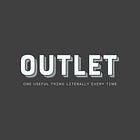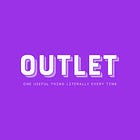12 Useful Things
A summary of every useful tool, trick, exercise and piece of advice I shared this year to help you live and work better.
Well, that was quite a year.
With just a few weeks left, another calendar will soon get turned over and you’ll be faced on the first of January with a hangover and a choice: should you even bother making a New Year’s Resolution?
I normally think the idea that you’re going to wake up one random Monday morning and completely change how you think and behave is a complete load of rubbish. However, I will still gladly reach out and grab hold of any motivation when it comes along at the right time. And for some strange reason, my motivation to commit a regular newsletter just happened to coincide with early January this year.
From a standing start, there are now over 5000 readers of OUTLET every month who love smashing through some of the noise to learn useful things to make work and life better. And it’s now easily my favourite thing to do each month.
Here are 12 Useful Things that we shared this year (including a brand new one at the end that some of you are going to find super useful!).
Let’s begin like it’s a carol. On the twelfth day of Christmas, my true love gave to me:
1. Treasure trove of insights
We started the year with a link to an invaluable Google Drive full of predictions and trends for the year from over a hundred of the smartest companies in the world compiled by some connected strategists. You can still access the extremely useful Google Drive of hundreds of presentations here. It doesn’t matter what industry you’re in, this folder is a future crystal ball for almost every topic imaginable, like technology, the economy, environment, social media, travel, ideas, talent acquisition, culture, gardening, food, media, drink, employee experience, transport, wellness, Web3, workplaces, digital marketing, real estate, influencers, fashion, customer experience, cyberthreats, retail, grocery, advertising, beauty, creative, events and more.
2. RACI matrix
The RACI Matrix (it’s pronounced as “racy”, which makes it seem a tad sexier than it is) stands for Responsible, Accountable, Consulted and Informed. It’s a simple and popular model used to clarify who is doing exactly what on any project that you’re working on. If you’ve ever worked for a big company, you might already be familiar with it, but there’s still a lot to learn about how to really use it properly. A RACI aims to solve the clusterf#ck situation where lots of people are working on a project, but no one has any idea who is doing what and you all end up doubling-up on tasks and re-doing things and hating everything and everyone around you.
3. Freedom app
Whenever I need to write, think or properly concentrate I click on a simple app on my computer called Freedom. It does just one thing: it disconnects you from the internet to give you as many minutes of “freedom” that you need from the rest of the world to try to address some of our attention problems. The Freedom app is so damn useful to me that I use it most days. It’s been my secret tool that I’ve used to write three books now (on top of a bunch of other things of course). You can check out the Freedom app for yourself right here and decide if it will be as useful to you.
4. User manual
If you want to understand how to get the most out of people you work with, you really need have a User Manual. This is a short template that everyone in your team fills out, and presents back on who they are and how they like to work. The aim is to communicate and better understand each other’s needs so you can learn what the ideal working conditions are for your colleagues. It also has the added benefit of helping you become more aware of your own ideal working styles so you can lean further into it.
5. Cerebration
A Cerebration is combination of two words, cerebral and celebration, like a party for your brain. It’s a streamlined way to come up with better creative ideas as a group. There are three main parts to using this idea-generating technique, each named after different elements of a party to make it easy to remember when you’re next sitting in your boardroom wondering what to do. To hold a Cerebration session, grab some of your colleagues together in a room or on Zoom (this tool has been built to work just as well in a hybrid world), and follow these steps.
6. Simple brief
A brief should be the beginning of most activities that you do at work, and nailing a brief that’s clear, to the point and, ideally, fits on just one page is ideal. A brief is the starting point to explore all of the possible solutions to something you’re trying to solve. If it’s too narrow in its remit, it restricts where you can go, and if it’s too wide, there will be too many paths to go down that will waste everyone’s time. Even if you don’t think you need a brief before starting a new project, you will get something out of just running through this useful exercise of writing it down on paper. It will force you to think more deeply about what you’re trying to do, and allow you to easily communicate with lots of people at once.
7. Work and life lessons
Three years ago I blew the ref’s whistle on the first half of my career. I’d worked basically full-time for two decades straight, beginning at 18 in the mailroom of an advertising agency and ending a few years after selling the media business I co-founded with some inspiring lifelong friends and business partners. At the time I wrote a LinkedIn post to try to sum up sum of the lessons I’d learnt in the first half of my career. I wanted to look with some objectivity at what just happened so that my second half could be even more informed, effective and aligned to what I want to achieve. This is a list of hard-earned lessons, in no particular order, that I really wish someone had told me during my career. It might have saved me a lot of heartache along the way and helped me worry less about some of the unimportant things.
8. ‘Centre The User’ exercise
Many meetings suck, so how can we make them better? One way is ensure that the reason for the meeting is super clear. Whenever I have a big meeting that I’m facilitating, I aim to get everyone into the minds of the customers, or consumers, at the start of the meeting. I do this using a simple 10-minute exercise called ‘Centre The User’ that I recommend you do at the start of your next meeting.
9. Ikigai
The Japanese concept of ikigai (pronounced ick-ee-guy) translates roughly as ‘reason for being’, and is a simple framework within which to figure out your reason to face the world every day, and start the process of understanding where you can derive meaning in your life from. Your ikigai looks at four areas: what you love, what you’re good at, what the world needs and what you can be paid for. Your ideal reason for being is when (if!) all four of these quadrants overlap in one central area that ticks all of those boxes.
10. Unroll.me
Every minute we spend slogging through our email in-box is a minute that we aren’t spending doing something that we love. So I consider it a major victory every time I joyfully unsubscribe from an email newsletter that I no longer read. To help me with this over the years I’ve used Unroll. It’s a free service that goes through your entire inbox, and allows you to unsubscribe from emails instantly with a single click. No more wasting time reading things you don’t want to read, or trying to figure out how to get off a mailing list. It’s super useful.
11. Hiring a car well
Having wrangled with attendants in over a dozen countries in recent years, I’m now uniquely qualified to give advice on the antiquated, confusing, uncomfortable process that regularly happens at the rental car counter. Instead of a strictly work topic, this one takes you step-by-step through somethings else that is extremely useful in life: how to hire a car well. There are three main stages of hiring at car: before you hire, at the counter, and once you have the keys. This is exactly what to do at each stage to avoid (as best you can) unnecessary hassles and cost.
12. Days and Event Calendar
I’ve worked with some very clever people over the years, learning from many of them even after we’ve stopped working directly together and they spread their tentacles into different areas of expertise. One of those is Celia Harding, a PR expert who worked in our agency and went on to launch her own innovative one several years ago. Celia has recently launched a Days and Events Calendar for 2024 and it’s super useful for anyone who will be creating content over the next 12 months.
It contains over 2,000 events listed on an interactive calendar with weird and wonderful awareness days, local and international public holidays, celestial events, key financial reporting dates, major sports fixtures and red-carpet events. Knowing what’s on when allows founders, social media managers, marketers and PR teams to strategically plan 2024 activity. It will be super useful to lots of people, and is my last Useful Thing for the year. Interact with all of the data that’s taken lots of time to put together, and send it on to someone in your life who has to constantly think up different ways of getting people’s attention next year, through marketing, PR or social content. It’s genuinely awesome.
So that’s it for the year.
Thank you so much for being an OUTLET subscriber. If you found anything about this monthly newsletter useful this year, the best way you can show appreciation is to share it with others who you think will also get something out of it (I’ll also accept the occasional email reply back, as I just adore those).
I’m now back in Mallorca after a wonderful and wild month in Egypt, and actually enjoying the cooler weather here for a change. After Christmas in the Canary Islands, I’ll be in Australia in February and April for a myriad of reasons.
But in the most exciting news of all, in next month’s OUTLET I’m going to give you the ultimate useful thing: all of the juicy details of the book I’ve spent the last few years researching and writing. I’m hanging to share everything with you, but you’ll have to wait until after the holidays to get you the full low-down.
Until then, have a great Christmas.
Tim












